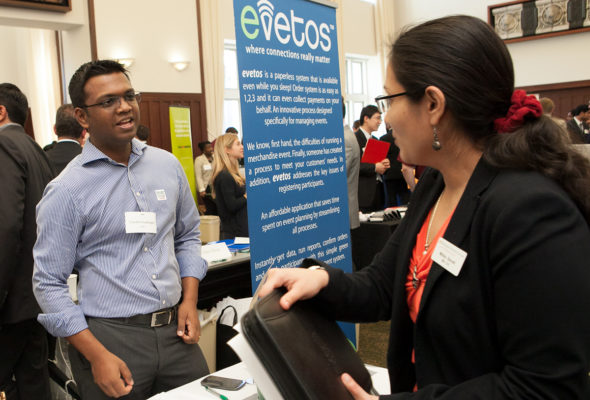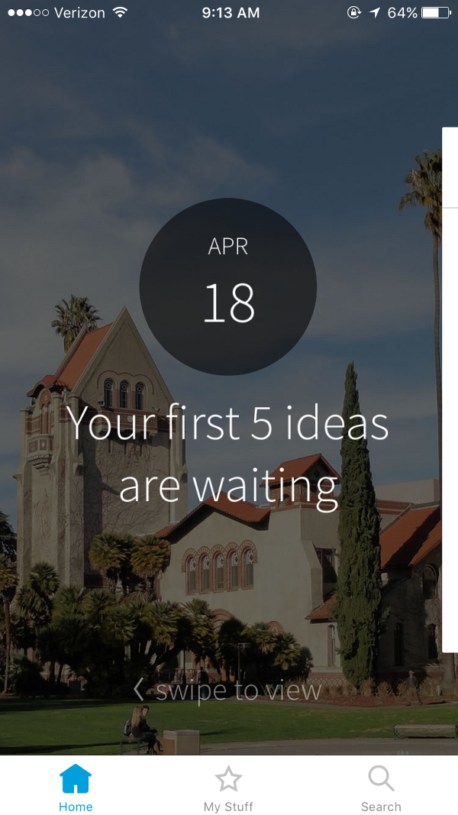In addition to expert advising and free coffee, Olin’s Weston Career Center offers courses, skill-building workshops, networking activities, and resources to prepare students for a lifetime of career management.
Students new to Olin may not be aware of the plethora of resources the WCC provides students. (Did we mention free coffee?) Allow us to introduce some of the WCC’s best offerings for students interested in career development or embarking on the job search:
Access to the Bloomberg Terminal
The Bloomberg Terminal allows students to access the Bloomberg data service, which provides real-time financial data, news feeds, and messages. The terminal is available in the WCC office by request.
Career development videos
On the Olin Careers website students will find recruiter advice and insights on topics such as résumé writing, effective business communications, interviewing, and strategic relationship building.
Guidance for veterans
Veterans have a proven record of performance and are ready to serve in civilian jobs where there is a need for leadership, team building, organizational commitment, and advanced technical training. The WCC offers coaching and resources for veterans and collaborates with the Olin Veterans Association to prepare students for the transition to civilian employment.
Interview Wiki
The Wiki is a student-editable archive of historical interview questions, along with other information, that is searchable by company. Students can update the Wiki questions after interviews to ensure that the questions are current.
LGBTQ resources
For the sixth consecutive year, the WCC was recognized with the highest level of certification (A+) by the national OUT for Work Career Center Certification Program.
The WCC offers resources to LGBTQ students seeking information on locating gay-friendly companies, coming out during the job search and transitioning into the workplace. In addition, the Weston Career Center partners with the WUSTL LGBT Student Involvement and Leadership office to provide a variety of programming. Any student seeking a confidential advising appointment may contact the Weston Career Center at wcc-director@olin.wustl.edu.
Management 201–Management Communications
A collaboration between faculty and Weston Career Center career advisor, MGT 201 Management Communication is a required course for all sophomores and offers students tools for a successful job search. Students get individualized attention to identify, articulate, and sell their value to an employer. They will develop their résumés, elevator pitches, and interview skills and build a strong online brand presence. Each professional development session is supplemented with workshops led by Weston Career Center experts, to provide hands-on tools and exposure to the technology and resources offered at Olin and the Weston Career Center. The course also teaches students to develop their business writing and public speaking skills as they solve real life client communication challenges.
Seminar series and workshops
Designed to give Olin students an advantage in the marketplace, seminars and workshops are presented by outside experts and corporate partners.
Working closely with our network of alumni, employers, and faculty, our employer relations team explores domestic and global markets for hiring trends and employment opportunities. We’re continually cultivating our partnerships with exceptional companies—and building a reputation for interns and graduates who are ready for business, with the tools and talent to create value for their organizations.

A student meets with a representative from evetos at the 2013 Meet the Firms event.
On-campus recruiting
Throughout the year, hundreds of companies recruit Olin students through on-campus, phone, and Skype interviews. The WCC interview-suite computers are fully equipped with Skype services and webcams that are available for student use.
BSBA and specialized masters students can apply for positions and sign up for interviews through CAREERlink. MBA candidates can do the same through MBAFocus.
Upcoming recruiting events:
Networking road shows and career fairs
The WCC sponsors several events to provide networking opportunities, including Meet the Firms events, domestic and international road shows, symposiums, New York and Silicon Valley Career Treks, and club-sponsored activities. Other networking opportunities include all-campus career fairs at Washington University.
A network of professional associations
Olin has chapters of the National Black MBA Association (NBMBAA), the National Society of Hispanic MBAs (NSHMBA), National Association of Women MBAs (NAWMBA), and Net Impact. These organizations sponsor annual career conferences that provide access to recruiting companies. In addition, these associations encourage academic and career development.
Olin is also a member of the Forté Foundation—a consortium of major corporations and top business schools that has become a powerful change agent in educating and directing talented women toward leadership roles in business.
In addition, Olin is a founding member of The Consortium for Graduate Study in Management—the country’s preeminent organization promoting diversity and inclusion in American business. The Consortium has built a 50-year legacy of fostering inclusion and changing the ethnic and cultural face of American business.
Information sessions
Companies host these events to enhance visibility on campus, preview the quality of Olin’s talent, and serve as a precursor to their on-campus recruiting schedules. Don’t miss the chance to meet recruiters and learn more about their companies, industries, and career opportunities.
Upcoming company information sessions:
- Tuesday, Sept. 6: AT&T, Reinsurance Group of America (RGA), Bain & Company, and Raymond James
- Wednesday, Sept. 7: Capital One, The Resource Group, and Bain & Company, Inc.
- Thursday, Sept. 8: Deloitte Consulting LLP and ECG Management Consultants
- Monday, Sept. 12: Cardinal Health and Booz Allen Hamilton
- Tuesday, Sept. 13: Bayer, Lincoln International, Kimberly-Clark and Travelers
- Wednesday, Sept. 14: Wal-mart and Bain & Company, Inc.
- Thursday, Sept. 15: Boston Consulting Group (BCG), Protiviti, Avascent, and General Mills
- Friday, Sept. 16: Deloitte Consulting
- Monday, Sept. 19: RBC Capital Markets & MasterCard International
- Tuesday, Sept. 20: Nielsen & Bloomingdale’s
- Wednesday, Sept. 21: Nielsen, Citigroup & Villhard
- Thursday, Sept. 22: Anheuser-Busch, Essilor & Accenture
Salary information and employment statistics
The WCC compiles internship and job-offer data to provide employment information to students, employers, and relevant partners. Information that is reported is confidential, and statistics are aggregated in report format.










